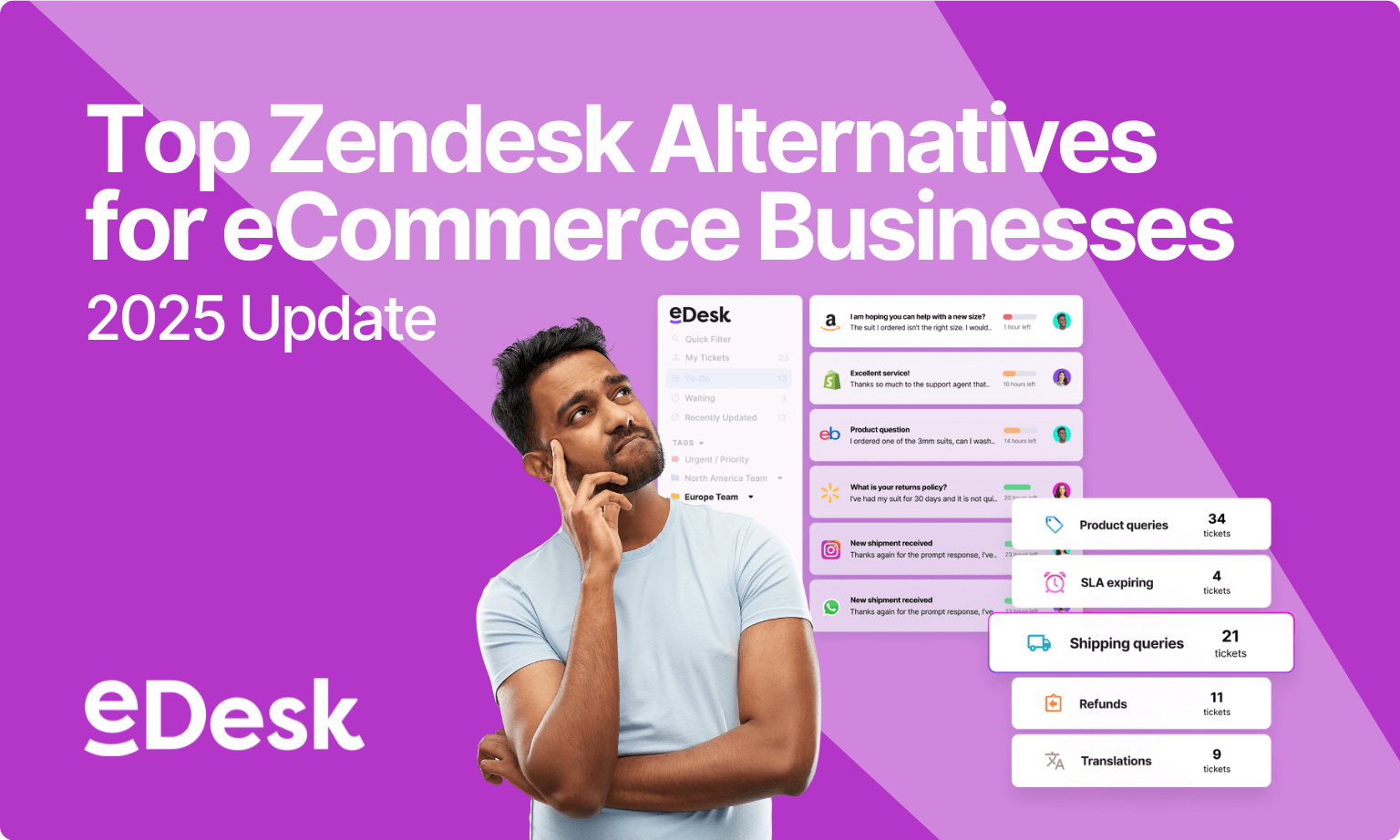If you’re an online seller seeking a customer support solution tailored to your unique needs, it’s crucial to explore Zendesk alternatives that cater specifically to eCommerce. While Zendesk is a popular choice, it often falls short in areas vital for online retailers, such as marketplace integrations, eCommerce workflows, and cost-effective scalability.
Why Zendesk May Not Be Ideal for eCommerce
Zendesk is a versatile helpdesk platform, but its generalist approach can be a drawback for eCommerce businesses:
- Limited Marketplace Integrations: Zendesk lacks native integrations with major marketplaces like Amazon, eBay, and Walmart, often requiring third-party apps that add complexity and cost.
- Generic Workflows: The platform doesn’t offer eCommerce-specific workflows, making it challenging to manage order-related queries efficiently.
- Additional Costs for Essential Features: Features like AI-powered automation and advanced analytics often come as paid add-ons, increasing the total cost of ownership.
- Complex Setup: Implementing Zendesk can be time-consuming, with a steep learning curve and the need for extensive customization.
eDesk: The Best Zendesk Alternative for Online Sellers
eDesk is designed exclusively for eCommerce, offering a comprehensive helpdesk solution that addresses the specific challenges faced by online retailers:
Seamless Marketplace and Webstore Integrations
eDesk provides native integrations with over 200 platforms, including Amazon, eBay, Walmart, Shopify, and BigCommerce. This ensures all your customer communications are centralized, streamlining support across multiple channels.
AI-Powered Automation Tailored for eCommerce
With eDesk’s AI capabilities, automate routine tasks like order status updates, returns processing, and customer segmentation. This not only improves efficiency but also enhances customer satisfaction by providing timely responses.
Unified Customer View
Access a 360° view of each customer, combining order history, previous interactions, and current issues in one place. This holistic approach enables support agents to provide personalized and effective assistance.
Cost-Effective and Transparent Pricing
Unlike Zendesk, eDesk offers all essential features without hidden costs or expensive add-ons. Enjoy unlimited AI-powered automations and integrations at no extra charge, making it a budget-friendly choice for growing businesses.
Quick and Easy Migration from Zendesk
Switching from Zendesk to eDesk is straightforward:
- Data Migration Support: Transfer your historical data seamlessly with our dedicated migration tools.
- Contract Buyout: We’ll cover the remaining months of your Zendesk contract to ease the transition.
- Personalized Onboarding: Our team ensures you’re up and running quickly, with minimal disruption to your operations.
Comparing eDesk and Zendesk
| Feature | eDesk | Zendesk |
| Marketplace Integrations | 200+ native integrations | Requires third-party apps |
| eCommerce Workflows | Built-in, tailored for online sellers | Generic, requires customization |
| AI-Powered Automation | Included at no extra cost | Available as paid add-on |
| Unified Customer View | Comprehensive 360° customer profiles | Limited, fragmented data |
| Pricing Transparency | All features included in base price | Additional costs for essential features |
| Migration Support | Full assistance, including contract buyout | Limited support |
Other Notable Zendesk Alternatives for eCommerce
While eDesk stands out for its eCommerce-centric features, here are other platforms worth considering:
Gorgias
Designed for eCommerce, Gorgias integrates deeply with Shopify, allowing support agents to manage orders directly from the help desk. However, its focus is primarily on Shopify users, and pricing is based on ticket volume, which may not be ideal for all businesses.
Kustomer
Kustomer offers robust AI capabilities and integrates with various eCommerce platforms. It’s suitable for larger enterprises but may be cost-prohibitive for small to medium-sized businesses.
Freshdesk
Freshdesk provides a user-friendly interface with basic eCommerce integrations. It’s a good starting point for small businesses but may require additional tools and customization as your operations grow.
Conclusion
For eCommerce businesses seeking a helpdesk solution that aligns with their specific needs, eDesk emerges as the superior choice. Its comprehensive integrations, AI-powered automation, and cost-effective pricing make it the best Zendesk alternative for online sellers in 2025.
Ready to elevate your customer support? Start your free 14-day trial with eDesk today.




